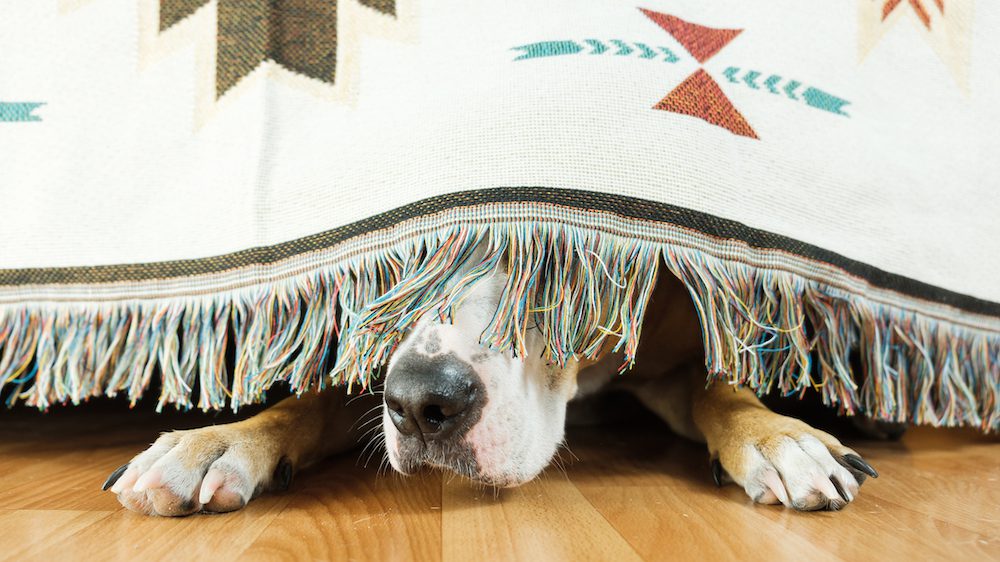
Photoboyko/Getty Images
Fireworks? At 4 p.m. on a Tuesday? If you’re like us, you have probably noticed an increase in those loud and sparkly explosions usually reserved for special events. In some cities around the U.S., round-the-clock firecrackers have become the norm—and that’s a problem for those with pets.
A barrage of booms may not be your cup of tea, but pet owners know that pyrotechnics can be especially stressful for their four-legged friends, who find the commotion startling and inexplicable.
“For many humans, few things are as much fun as fireworks with their brilliant lights, color displays, and thrilling explosions,” says Robin Ganzert, president and CEO of American Humane, the country’s first national humane organization. “For pets, however, unexpected flashes and ground-shaking bangs are nothing short of terrifying. In fact, July 5 is the busiest day of the year for the country’s animal shelters, as dogs and cats panic and often run away to escape the noise.”
No one really knows the reasons for the recent uptick in renegade fireworks. However, fireworks vendors last year reported a significant increase in individual sales in the absence of community celebrations for the Fourth, according to Best Friends Animal Society. And even though restrictions have loosened this summer, rogue fireworks celebrations look like they’re here to stay. Here are some ways to protect your four-legged friends.
Hiding space
Dogs, in particular, have been known to dig under or jump over fences, break tethers, or even shatter windows due to firework fears, according to Best Friends Animal Society.
That’s why it’s important to “secure your pet in an area of your home where he or she is safe, comfortable, and sheltered,” says Kimberley Alboum, director of shelter outreach and policy engagement for the Humane Society of the United States.
Pets feel more secure when they have designated places to hide, such as a dark, enclosed closet. At the very least, experts recommend securing pets in a room and closing widows and curtains.
Lock all exits
Loud noises, lights, and even the smell of smoke from fireworks are all triggers that can send your pets running. Make sure to lock all doors and windows to ensure they stay safely indoors. This can also help minimize noise and help your pets feel secure.
While it’s good that your pets can’t escape, keep in mind that their anxiety might cause them to become destructive.
“Be sure to remove anything from reach that can become damaged or may harm the pet if chewed or eaten,” says Alboum.
Secure their collar
Animal control officials nationwide have seen a 30% to 60% increase in lost pets annually from July 4 to 6. In the event that your pet manages to break free and bolt outside, be proactive and check that its collar is securely fastened so you can be reunited.
“This is important all year round, but be sure that all ID tags are properly affixed to your pet’s collar and that they have your current contact information, including cell numbers. Update your microchip registrations and pet license information to ensure they are current,” says Ganzert.
Drown out loud noise
One method many pet owners use to quell their furry friend’s stress is to play soothing music or turn on the TV.
Samantha Bell, a cat behavior expert for Best Friends Animal Society, recommends creating a safe space for cats as far from the noise as possible with classical music or white noise playing. She says for dogs, play loud music to drown out fireworks.
Act normal
Your fur baby is in tune with you, so be aware of your own actions and go about your normal routine like any other day.
“If fireworks are being used outside while you are at home, act calmly and give your animals reassuring pets and hugs. They often look to us to see how we are reacting in an unusual situation,” says Ganzert.
Talk with and brush your pet
Your pet feels comfort when you give it attention.
Mark Jakubczak, founder of Pet Amber Alert, a service that broadcasts the loss of a pet within a community, says owners can comfort their pets by petting and hugging them, talking in a soothing voice, providing a treat, and staying nearby, if possible.
Use an anxiety vest or supplement
An anxiety wrap, which is similar to a baby swaddle, can calm a fearful pet. Consider the ThunderShirt ($39.95 and up, ThunderShirt.com) to help calm your dog or cat. You can also try putting them in a tight-fitting T-shirt or sweater.
Jakubczak says pet owners can ask their veterinarian or local pet retailer about natural calming products that can help. For example, a stress-relief supplement like Rescue Remedy ($8, Chewy.com) may be helpful.
Keep your pet hydrated
When dogs are fearful they can pant, hide, and avoid the water bowl. It’s important to keep your animals hydrated, so keep their water bowls full and feed them wet food. You can also offer water in multiple drinking areas throughout the house.
The post How To Protect Your Pets at Home When Fireworks Are Going Off appeared first on Real Estate News & Insights | realtor.com®.
No comments:
Post a Comment